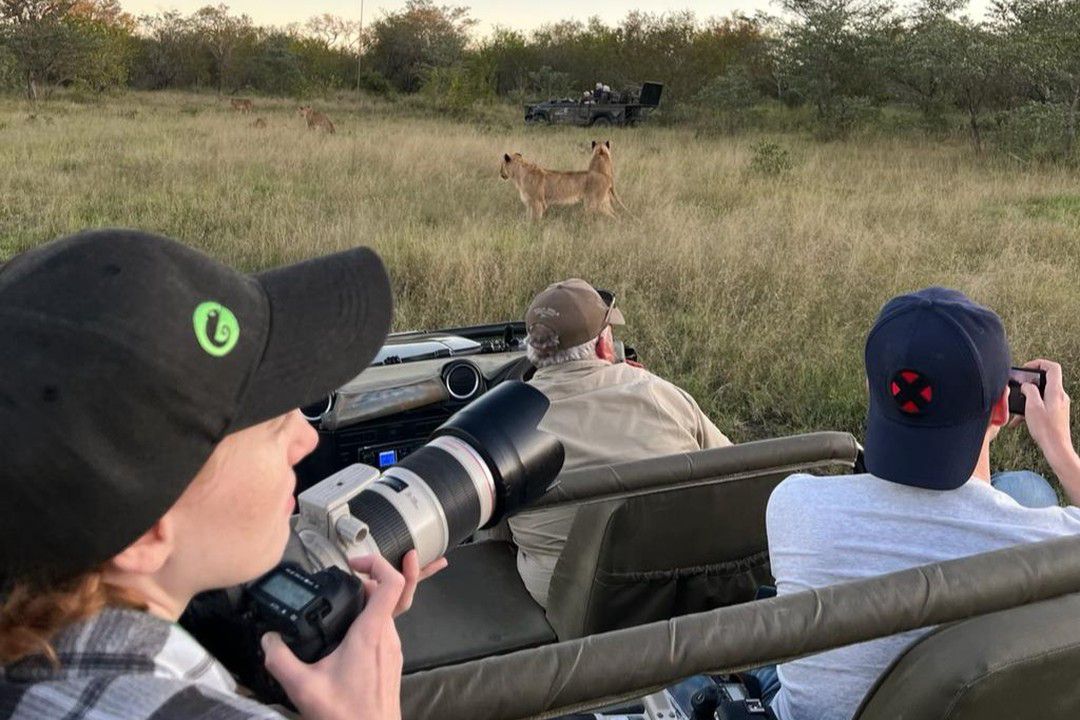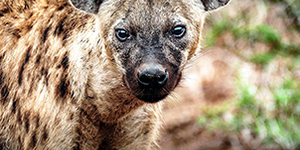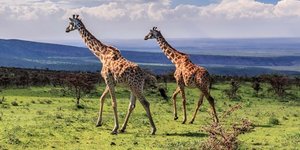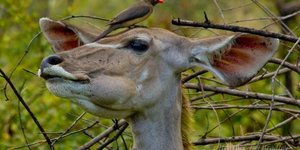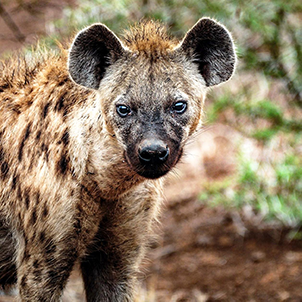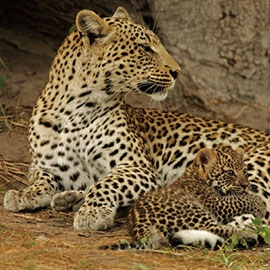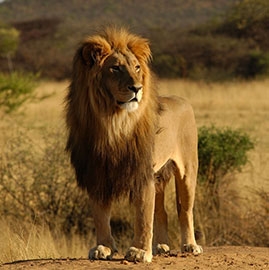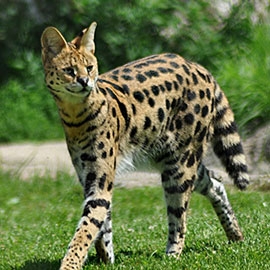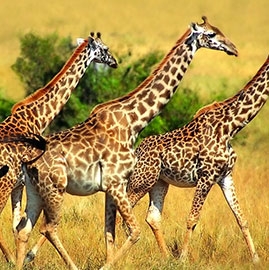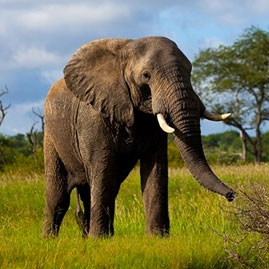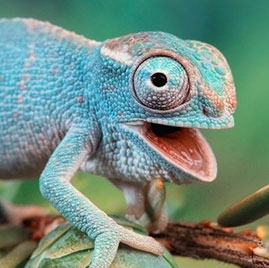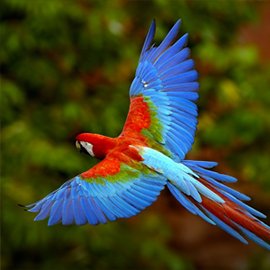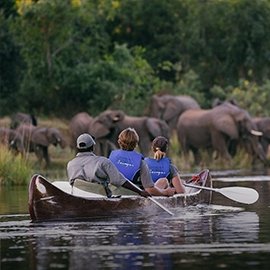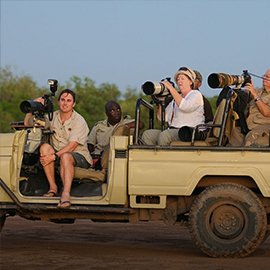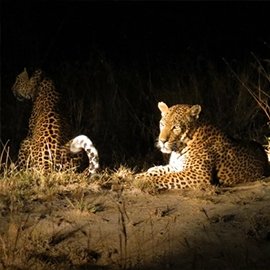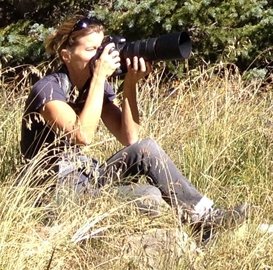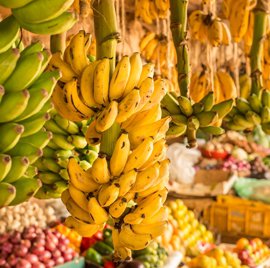Katavi National Park
Safari suitability: 7/10
Find your tourFor the truly intrepid, a long journey and large animals await.
What YAS members think
Highlights
- A bloat of hippos, a bask of crocodiles, a parade of elephants
- An isolated wilderness
- An ever-varying, seasonally driven scape
About Katavi National Park
Truly remote Katavi National Park is situated along the Rukwa Rift Basin in western Tanzania, 550 km (340 miles) from Mbeya and 1,250 (800 miles) from Dar es Salaam. First protected in 1911 and established in 1996, 471 km² (1,726 mile²) Katavi is Tanzania’s oldest national park. Animals are abundant, particularly along the seasonal Katuma River and lakes Katavi and Chada; visitors, however, are few. Found within this isolated wilderness are waterfalls, woodlands, shrublands, grasslands and seasonal river floodplains. Much of the park’s scape is weather-dependent—the wet season’s flowing Katuma River reduces to a mere stream in the dry season, when it beckons thirsty animals to sip at the area’s sole source of drinking water. Many species of medium to large mammal, including zebra, buffalo, impala, elephant, giraffe, lion and leopard, make their home in Katavi, and crocodile and hippo are known to wallow and snap in its seasonal rivers and lush marshes. Elephant, too, is plentiful.
Canoeing safaris, walking, driving and camping await those who visit this isolated park.
When is the best time of year to visit Katavi National Park?
Travelers willing to make the long trek by vehicle, railway or chartered plane should visit during the dry season (between May and October); park roads often flood during the rainy season (October to April), which drops 930 mm (36.6 inches) on the area.
 United States
United States
This park doesn't have a lot in the way of infrastructure. If you are coming in on a flight and have a full guided tour set up, that's great. If you are passing through on the bus to/from Kigoma, you will have to work to see this park - that is, beyond just the bus ride. You will pass through the park on the bus, and see a lot of wildlife in this way as it is. However, this is a bus in Africa. You only stop for short restroom breaks, during which you may lose you your seat. And, you may not have room to turn your head, let alone snap some photos out the window. It's wonderful, but get a car and driver somewhere nearby and head into the park proper to really see it. This is elephant and hippo heaven...elephants in the forests and hippos in the water. Soak up the sun (this is kind of a joke - it is HOT here) and enjoy the ride!
Sort by:

Katavi National Park offers an unforgettable wildlife experience. From herds of elephants to lions lazing in the shade, every moment felt like a scene from a documentary. Its remote location ensures intimate encounters with nature, though the rugged terrain presents challenges. Despite this, it's a must-visit for anyone seeking an authentic safari adventure.

Nestled in the heart of Tanzania, Katavi National Park stands as a testament to unspoiled wilderness and untamed beauty. This comprehensive review unveils the secrets of this hidden gem, offering insights into its diverse ecosystems, abundant wildlife, and unparalleled safari experiences. Location and Accessibility: Katavi National Park is situated in the remote southwestern region of Tanzania, making it a pristine haven for wildlife enthusiasts seeking an off-the-beaten-path adventure. Despite its remoteness, the park is accessible via both air and road, with chartered flights and guided safaris offering convenient transportation options. Breathtaking Landscapes: The park's landscape is a tapestry of diverse habitats, ranging from vast plains and seasonal floodplains to dense woodlands and escarpment landscapes. Visitors are treated to breathtaking vistas of the Katuma River, whose meandering waters sustain an array of wildlife throughout the year. Wildlife Diversity: Katavi is renowned for its abundance of wildlife, including large herds of buffalo, elephant, and hippopotamus. The park is also home to prides of lions, elusive leopards, and rare antelope species such as sable and roan. Birdwatchers will delight in the park's prolific avian population, with over 400 species recorded within its borders. Safari Experiences: Embarking on a safari in Katavi is an unforgettable experience, offering unparalleled opportunities for game viewing, birdwatching, and immersive nature walks. Guided safaris led by experienced rangers provide insight into the park's ecosystems, while night drives offer glimpses of nocturnal wildlife activity. Conservation Efforts: Katavi National Park is committed to conservation efforts aimed at preserving its pristine wilderness for future generations. Initiatives such as anti-poaching patrols, community outreach programs, and habitat restoration projects ensure the park's long-term sustainability. Accommodation Options: Visitors to Katavi can choose from a range of accommodation options, including luxury tented camps and rustic bush camps. Each offers a unique blend of comfort and immersion in nature, allowing guests to unwind amidst the sights and sounds of the African bush. Planning Your Visit: When planning a visit to Katavi National Park, it's essential to consider factors such as seasonal weather patterns, park regulations, and accommodation availability. Booking in advance and seeking guidance from reputable tour operators ensures a seamless and enjoyable safari experience. Conclusion: In conclusion, Katavi National Park stands as a testament to Africa's natural beauty and biodiversity. From its awe-inspiring landscapes to its diverse wildlife and immersive safari experiences, this hidden gem offers a journey of discovery like no other. Whether you're a seasoned safari enthusiast or a first-time visitor, Katavi promises an adventure of a lifetime amidst the untamed wilderness of Tanzania.
Serengeti sees over 300,000 safarians each year; Katavi, about 1,000 (with half of them local Tanzanians). These two orders of magnitude have serious consequences. In the peak of the tourist season in Ngorongoro up to $80 US may descend onto a single poor cheetah, turning the whole experience into something like a zoo. In contrast, during our six days in Katavi, we would get excited if we saw another vehicle in the distance; cars being rarer and harder to spot than elephants or giraffes.
If youre looking to see an intense and unviolated nature and wildlife experience go nowhere but Katavi National Park. Affordable fees and the safari camp lodge I stayed was amazing and offered us with game drives and a well-trained, helpful ranger with a top-notch service not to mention the great people all around and food (oh you dont want me to start explaining about this Yummyyyy!!!!). I really felt like the park is in my backyard. Good roads helped us to have a breathtaking view of all kinds of creatures from troops of elephants and impalas roaming the park, warthogs, giraffes and lions and leopards during a night drive. And oh, how can I not mention the numerous hippos and crocs at one instance just like I did in Katuma River. The birds and green scenery are simply one of kind making this isolated but humongous park a great place to spend your vacation. Quite far but worth a second visit without a doubt.
I have visited Katavi twice. I will contrast it with the Northern TZ parks (Serengeti, Tarangire, Manyara and Ngorongoro) I have visited. Katavi is remote. There are no crowds. It isn't easy to get there. There are occasional flights to Mpanda. The feel of the Katavi district is not that of a tourist district. However, it is a wonderful place to be. You need to work with a very reliable tour operator for lodging and vehicles, because there are not the many choices available in the more touristy areas. Katavi has the most amazing collection of hippos, birds, and crocs I have ever seen. Some of my best lion experiences have been there. The hippos and crocs in Katavi are hugely more present than any of the other parks. When driving into the park from the north, tsetse flies were a bit of a hassle. But we got past them after about a half hour.
One of the smallest national parks in tanzania , Katavi National Park is an untouched natural wildlife haven. Remote and far from civilisation, one has to have a certain insistent, determination to go there as I found out. The travel agents will promote other big parks in Northern Tanzania and talk less about Katavi. We were on a countrywide tour of Tanzania and KNP was our next stop. Due to its remoteness, getting to KNP by vehicle is not advisable. Chartering a light aircraft from Arusha will get you there in 4 hrs time. There are few lodges in the camp, 3 if am not wrong so make proper travel arrangements before embarking on your visit there. Our stay was at Chada camp, a temporary 6 tented camp in KNP. After a well deserved nights rest, we were provided our own guide. Before our drive we were advised to change our clothes, apparently bright colors attract tsetse flies which are very common in the park (wear clothes with blending bush colors). Visitors are advised to travel in the dry season since there is plenty of game then, but we saw similar if not plenty game here and it was on the wet season. The vegetation was green and lush. We saw hippos playing in pots of water, zebras afar in the grassland, large prides of lions numbering over 20, elephants, buffalo, giraffes were all around us. Everything was flourishing around us, unlike in the dry season where there is competition for limited resources. The game drive was amazing--private, comfortable, no interference from other travellers, truly unique. Private, remote, secluded not a tourist circus, KNP is an unspoilt natural marvel. For the adventurous spirits out there, KNP is a must visit, but shhh don't tell too many people!
Domestic flights to Katavi National Park
Due to its remote location on the opposite side of the country to Dar es Salaam and Arusha, domestic flights are recommended for Katavi.
Safari Air Link offers scheduled flights from Ruaha to Katavi. Check the schedule before booking as timetables change and flights aren't daily.
The following airlines travel to Katavi National Park

As Salaam Air has grown to be a leading air carrier between the Tanzanian Islands. Our experienced team understands that customer satisfaction is important to the creation of a successful flight operation. Thus, we go above and beyond to satisfy our clients. The airline plies eight routes to promote tourism within and outside the country. We have two fuel-efficient aircraft Cessna 208B Grand Caravan and Embraer EMB 120 Brasilia, which are good for the environment and the safety of our clients.We would like to help you discover more about our Islands here on our website and at every step of your journey Visit website
Also flies to:


Auric Air Services Ltd is Tanzania's preferred corporate and safari airline with a wide network of domestic scheduled services with daily scheduled services to more than 30 destinations and handles approximately 8500 passengers every month. From its bases at Mwanza AirportMwanza, Julius Nyerere International AirportDar-es-salaam and Arusha Airport, Auric Air provides scheduled charter flights to some of the most remote and otherwise inaccessible destinations (parks & game reserves) within Tanzania. Visit website
Also flies to:




Affordable Flights now connect the most remote and exciting parts of Tanzania - Zanzibar/Dar/Selous/Mikumi and Ruaha to Katavi and Mahale National Parks. Daily Flights from Zanzibar or Dar to Ruaha National Park via Selous or Mikumi. Visit website
Also flies to:


Premier safari airline and charter. Safarilink is Kenya's premier safari airline with a network of connecting domestic scheduled services to all the best safari destinations within Kenya and across the border into northern Tanzania. From it's base at Wilson Airport, Nairobi SafariLink provides daily scheduled flights to Masai Mara, Amboseli, Tsavo West, Naivasha, Nanyuki, Lewa Downs, Samburu, Lamu, Kilimanjaro, Loisaba, Migori and Diani Beach. Additionally it can also provide private charter flights if a client's particular requirement as regards destination or timing cannot be met by the scheduled services. Visit website
Also flies to:



TANZANAIR was formed in 1969 and pioneered aviation throughout Tanzania. Today it continues to live up to its slogan as theComplete Aviation Company. It was founded by Dinos J Samaras who managed the Company until he passed away in April 2010. It is now headed by his son John Samaras who was his deputy since 1983. With 45 years experience, TANZANAIR offers tailor-made air travel to suit the needs of its customers. With a modern fleet of twin and single-engine Cessna and Beechcraft turbine aircraft, TANZANAIRs well-established reputation leads the way in air charter services throughout the region. TANZANAIR operates out of its own purpose-built Passenger Terminal located between Terminal I and II at Julius Nyerere International Airport in Dar es Salaam. The passenger lounge is adjacent to the two hangars. It is housed within a secure wall enclosed compound with ample parking facilities. Visit website
Also flies to:


Flown by an international team of pilots, Zantas Air has one of the youngest fleets of Cessna Grand Caravans in Tanzania. These are maintained to the highest safety standards and comply with the ICAO, CESSNA, and TCAA directives. We have an exclusive lounge at Arusha airport. Guests can relax in our comfortable lounge while they wait for their flight. Our operations are designed to suit our client's needs with a customized itinerary based on their schedule. Zantas Air works with its sister company, Mbali Mbali Lodges and Camps, to offer shared charter flights. We fly passengers from Northern Tanzania to Western Tanzania twice a week on Monday and Thursdays. Visit website
Also flies to:

Katavi map
Nearby parks and game reserves
Related articles
Latest photos
